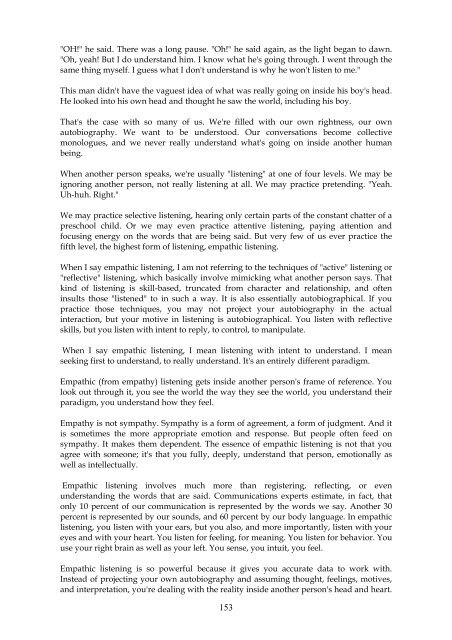Covey - The 7 habits of highly effective people
You also want an ePaper? Increase the reach of your titles
YUMPU automatically turns print PDFs into web optimized ePapers that Google loves.
"OH!" he said. <strong>The</strong>re was a long pause. "Oh!" he said again, as the light began to dawn.<br />
"Oh, yeah! But I do understand him. I know what he's going through. I went through the<br />
same thing myself. I guess what I don't understand is why he won't listen to me."<br />
This man didn't have the vaguest idea <strong>of</strong> what was really going on inside his boy's head.<br />
He looked into his own head and thought he saw the world, including his boy.<br />
That's the case with so many <strong>of</strong> us. We're filled with our own rightness, our own<br />
autobiography. We want to be understood. Our conversations become collective<br />
monologues, and we never really understand what's going on inside another human<br />
being.<br />
When another person speaks, we're usually "listening" at one <strong>of</strong> four levels. We may be<br />
ignoring another person, not really listening at all. We may practice pretending. "Yeah.<br />
Uh-huh. Right."<br />
We may practice selective listening, hearing only certain parts <strong>of</strong> the constant chatter <strong>of</strong> a<br />
preschool child. Or we may even practice attentive listening, paying attention and<br />
focusing energy on the words that are being said. But very few <strong>of</strong> us ever practice the<br />
fifth level, the highest form <strong>of</strong> listening, empathic listening.<br />
When I say empathic listening, I am not referring to the techniques <strong>of</strong> "active" listening or<br />
"reflective" listening, which basically involve mimicking what another person says. That<br />
kind <strong>of</strong> listening is skill-based, truncated from character and relationship, and <strong>of</strong>ten<br />
insults those "listened" to in such a way. It is also essentially autobiographical. If you<br />
practice those techniques, you may not project your autobiography in the actual<br />
interaction, but your motive in listening is autobiographical. You listen with reflective<br />
skills, but you listen with intent to reply, to control, to manipulate.<br />
When I say empathic listening, I mean listening with intent to understand. I mean<br />
seeking first to understand, to really understand. It's an entirely different paradigm.<br />
Empathic (from empathy) listening gets inside another person's frame <strong>of</strong> reference. You<br />
look out through it, you see the world the way they see the world, you understand their<br />
paradigm, you understand how they feel.<br />
Empathy is not sympathy. Sympathy is a form <strong>of</strong> agreement, a form <strong>of</strong> judgment. And it<br />
is sometimes the more appropriate emotion and response. But <strong>people</strong> <strong>of</strong>ten feed on<br />
sympathy. It makes them dependent. <strong>The</strong> essence <strong>of</strong> empathic listening is not that you<br />
agree with someone; it's that you fully, deeply, understand that person, emotionally as<br />
well as intellectually.<br />
Empathic listening involves much more than registering, reflecting, or even<br />
understanding the words that are said. Communications experts estimate, in fact, that<br />
only 10 percent <strong>of</strong> our communication is represented by the words we say. Another 30<br />
percent is represented by our sounds, and 60 percent by our body language. In empathic<br />
listening, you listen with your ears, but you also, and more importantly, listen with your<br />
eyes and with your heart. You listen for feeling, for meaning. You listen for behavior. You<br />
use your right brain as well as your left. You sense, you intuit, you feel.<br />
Empathic listening is so powerful because it gives you accurate data to work with.<br />
Instead <strong>of</strong> projecting your own autobiography and assuming thought, feelings, motives,<br />
and interpretation, you're dealing with the reality inside another person's head and heart.<br />
153


